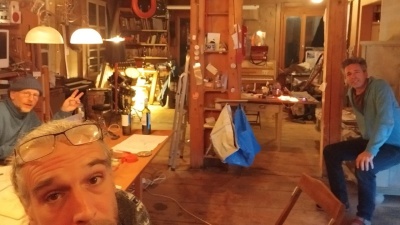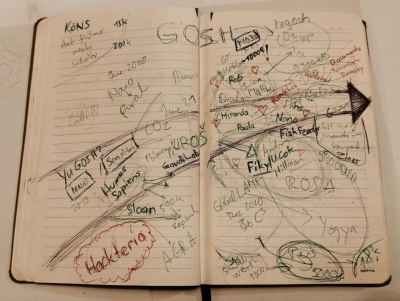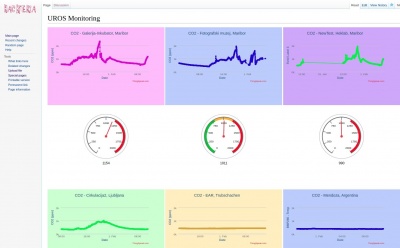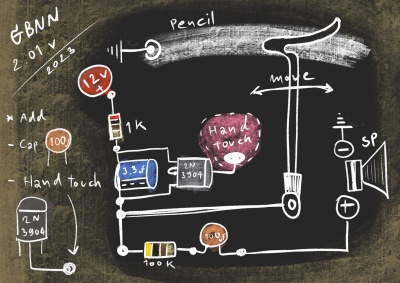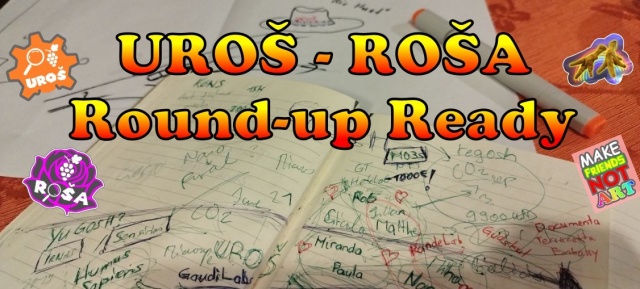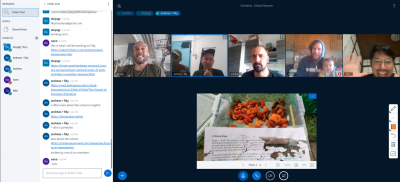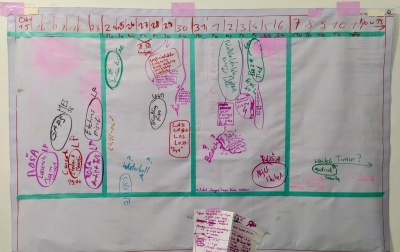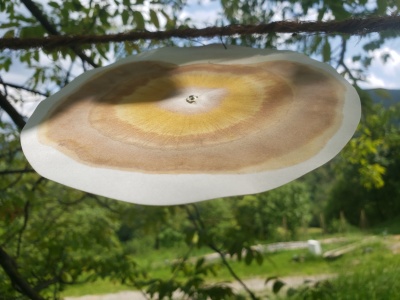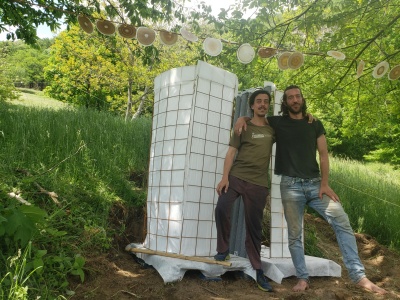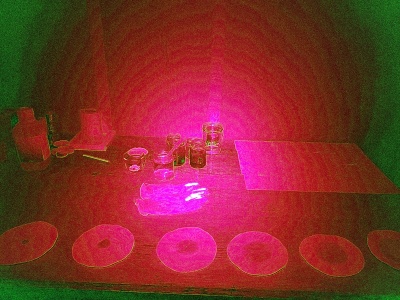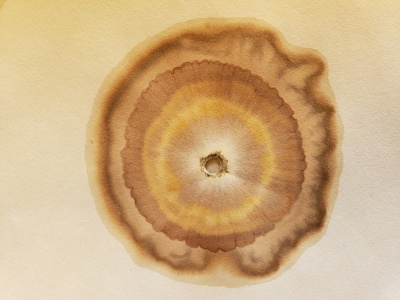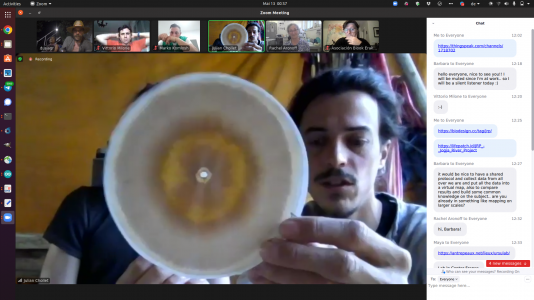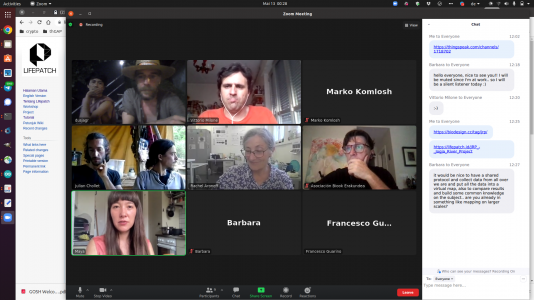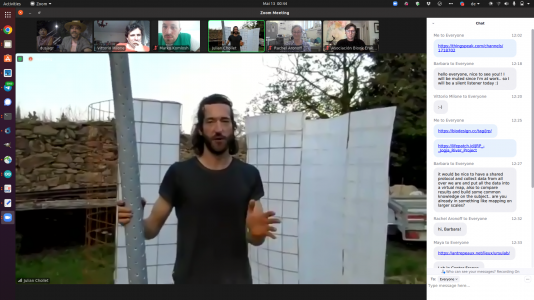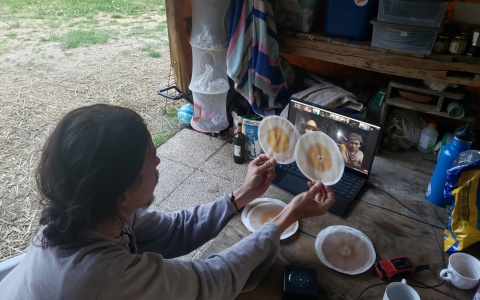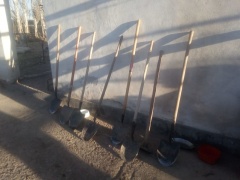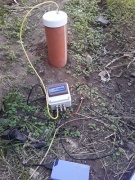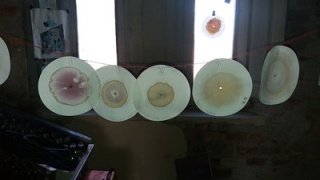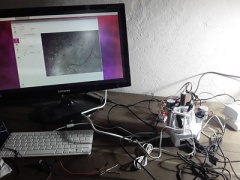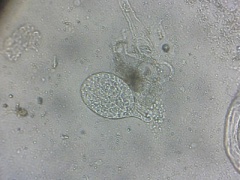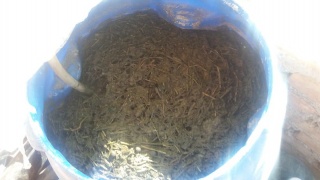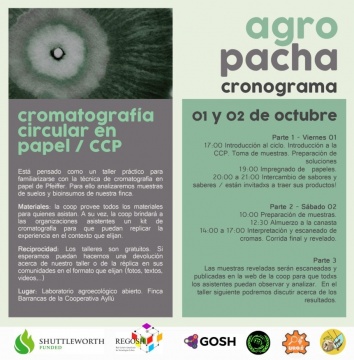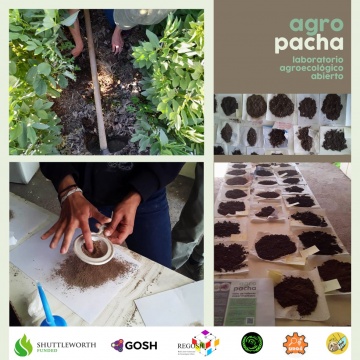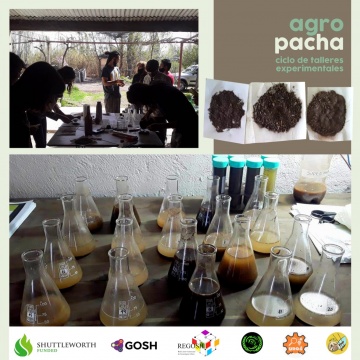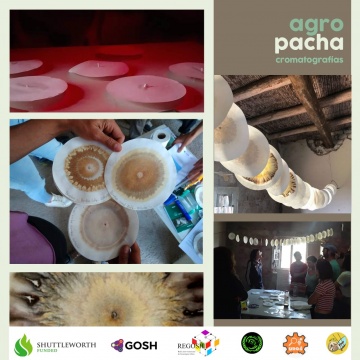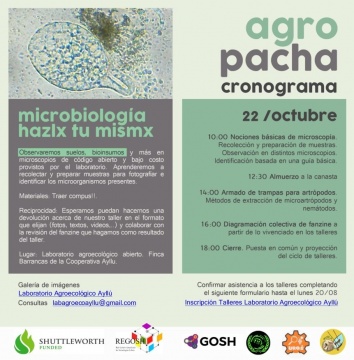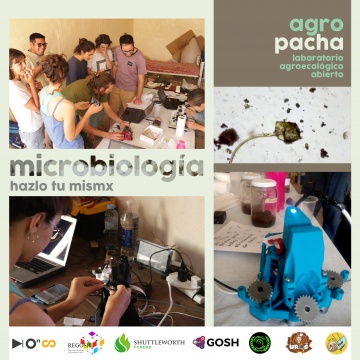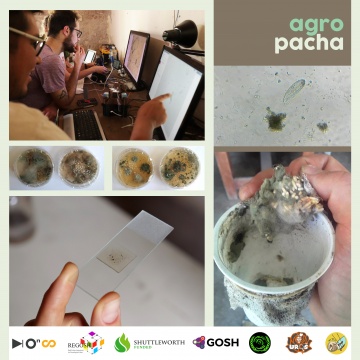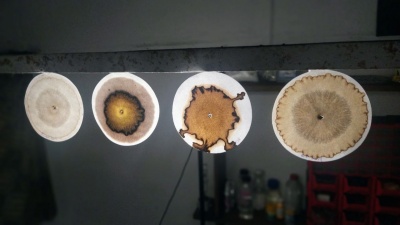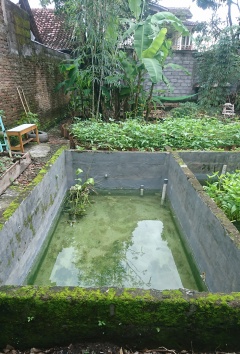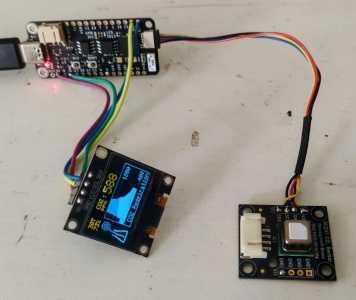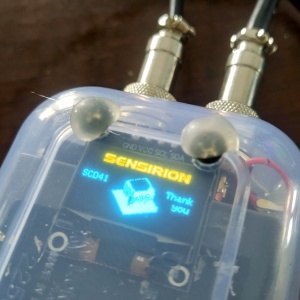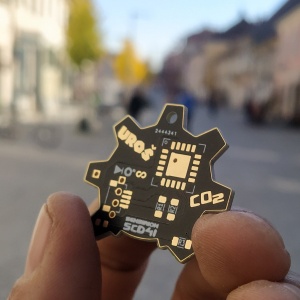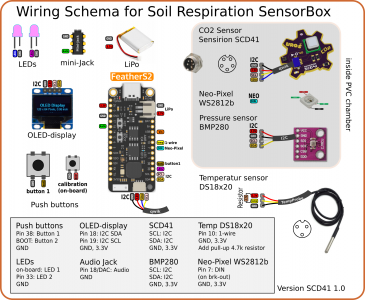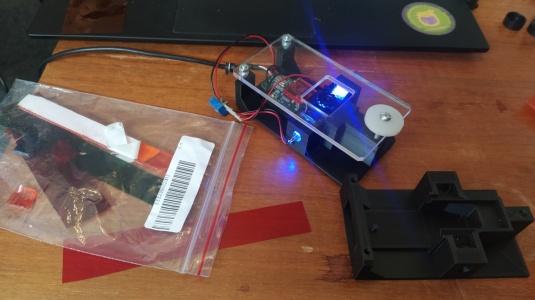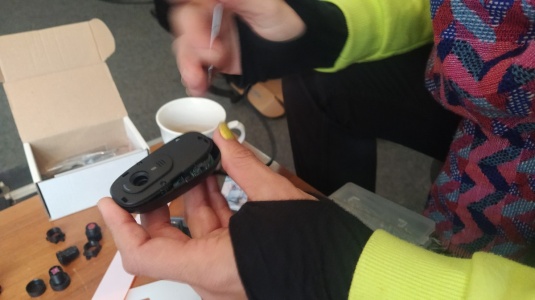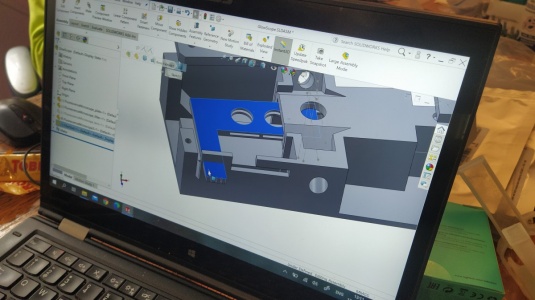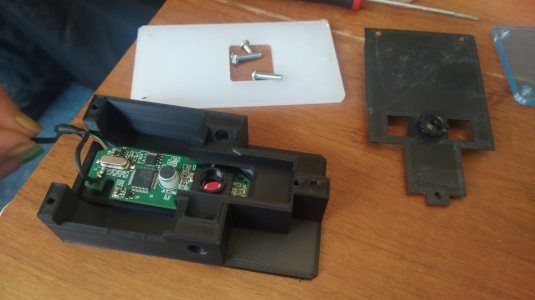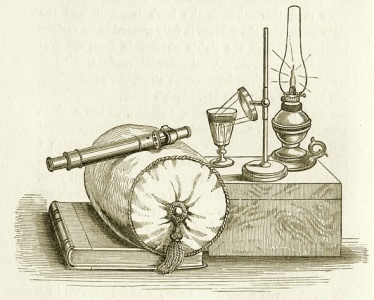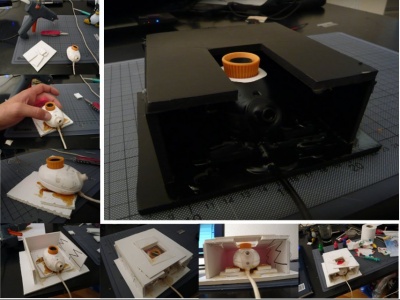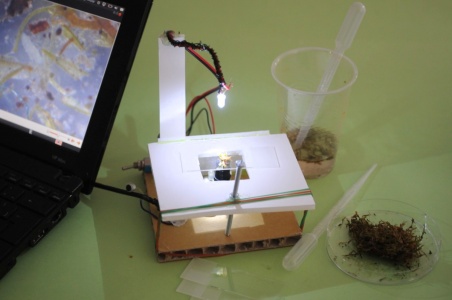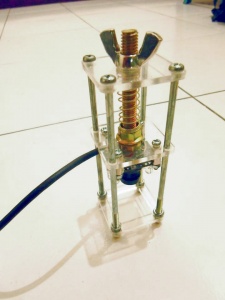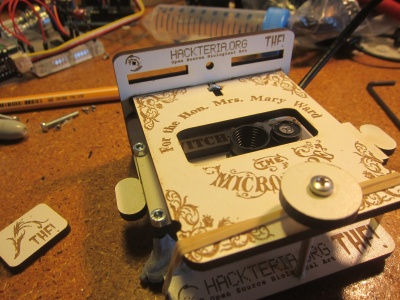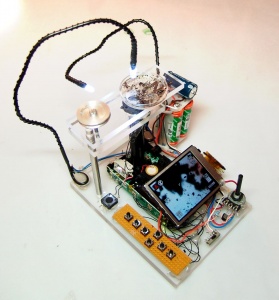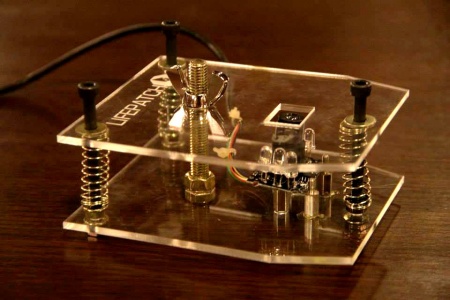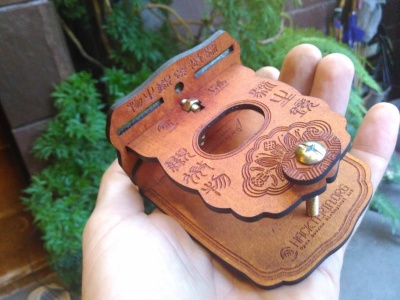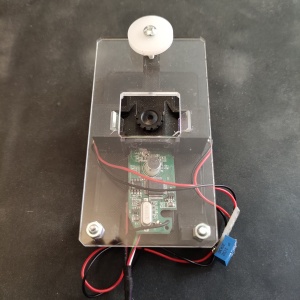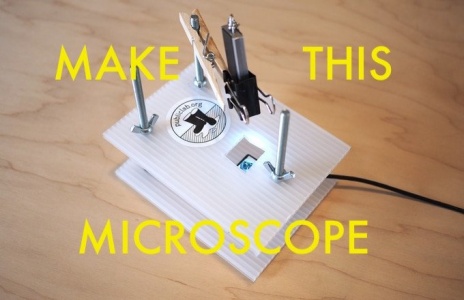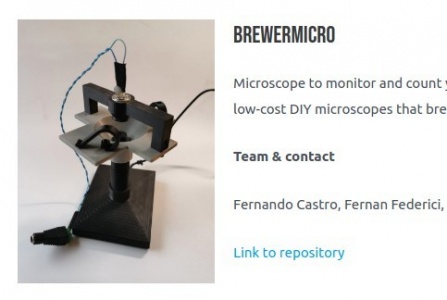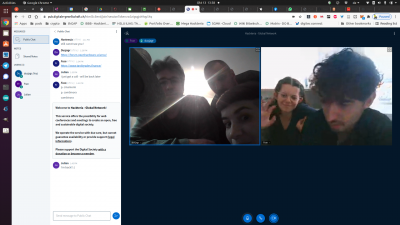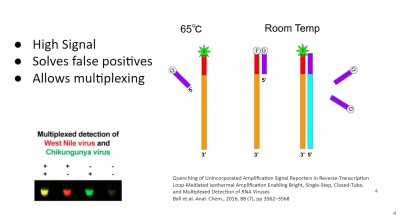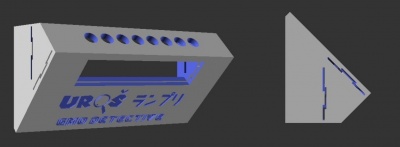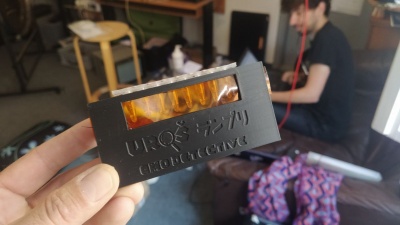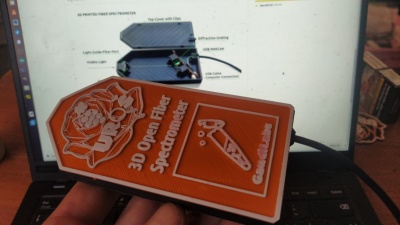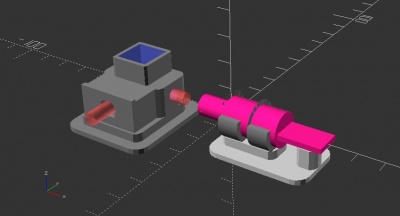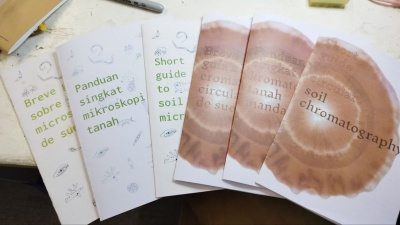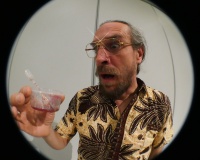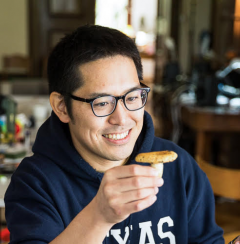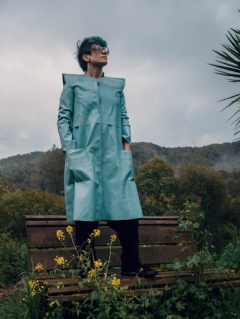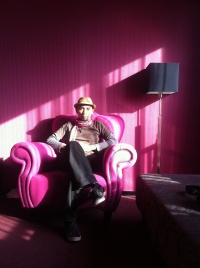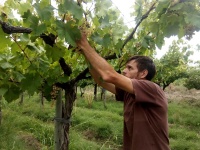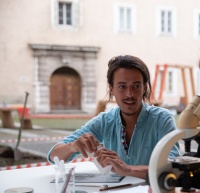UROS
Contents
- 1 UROŠ - Ubiquitous Rural Open Science Hardware
- 1.1 Ongoing activities: Round-Up Ready
- 1.2 UROŠ - ROŠA| Round-up Ready
- 1.3 Recent activities: ROŠA - Yogyakarta
- 1.4 Introduction
- 1.5 Schedule of Activities
- 1.6 UROŠ Temporary Autonomous Lab
- 1.7 Remote Research Projects
- 1.8 Research Nodes
- 1.9 UROŠ Soil Zines
- 1.10 People
- 1.10.1 Marc Dusseiller aka dusjagr (Switzerland)
- 1.10.2 Masato Takemura aka Take (Japan)
- 1.10.3 Paula Pin (Spain)
- 1.10.4 Andreas Siagian aka ucok (Indonesia)
- 1.10.5 Fernando “Nano” Castro (Argentina)
- 1.10.6 Julian Chollet | mikroBIOMIK (Germany)
- 1.10.7 Malte Larsen | mikroBIOMIK (Germany)
- 1.10.8 Counselors
- 1.10.8.1 Fiky & Dina | Kunci (Indonesia)
- 1.10.8.2 Greg Austic | our-sci (USA)
- 1.10.8.3 Nur Akbar Arofatullah | Widya Lifescience (Indonesia)
- 1.10.8.4 Urs Gaudenz | GaudiLabs (Switzerland)
- 1.10.8.5 Fran Quero | CRI (Spain/France)
- 1.10.8.6 Hortense Vielfaure | CRI (France)
- 1.10.8.7 Luka "Musti" Mustafa | IRNAS (Slovenia)
- 1.10.8.8 Matej | KryptoEvangelist (Slovenia)
- 1.10.8.9 Rob Canning (Slovenia)
- 2 Related earlier activities
UROŠ - Ubiquitous Rural Open Science Hardware
We are happy to announce an upcoming series of events and activities to be held starting this autumn 2021 and continued throug-out the upcoming months, globally connected in the Hackteria Network and GOSH community and regionally bringing together some interesting people to collaborate, share, learn, develop in Maribor, Slovenia. Supported and part of konS ≡ Platform for Contemporary Investigative Arts.
Ongoing activities: Round-Up Ready
EAR Proposal Retreat, Jan 7th-13th 2023 - Trubschachen, Switzerland
https://ear.education/proposal-retreat/
Finalizing and donating an UROŠ CO2 Monitoring station to EAR!
Jan 2023 - Maribor, Slovenia
UROS Monitoring
GBMN - Sanft, aber macht Lärm
UROŠ - ROŠA| Round-up Ready
31. Jan - 14. Feb 2023 @ Kulturni Inkubator, Maribor
See announcement on MKC konS ≡ Platform website
"UROŠ - ROŠA| Round-up Ready" is opening with a lecture / performance by Marc Dusseiller aka dusjagr, also known as Pakdeh Marcjono, inviting the audience on a travel through space and time, stories around the UROŠ - ROŠA network activities from the hacklabs in Maribor, Slovenia, to the coconut beaches of Gunung Kidul, Daerah Istimewa Yogyakarta, Indonesia.
UROŠ - Ubiquitous Rural Open Science Hardware, was a series of events, research and collective activities held since summer 2021 and continued throughout the following months, globally connected in the Hackteria Network and the GOSH (Gathering for Open Science Hardware) community, and regionally brought together enthusiastic people to collaborate, share and learn together in Maribor, aswell as connected through various online tools for collective research and collaboration.
Many projects and connections were followed further in different local contexts accros the globe and lead towards more activities during ROŠA - Regional Open Science Hardware & Art, Indonesia, shared online and onsite, as performances, prototpyes, workshops and a large collection of stickers!
Coming together is a beginning,
Keeping together is progress,
Working together is success. Quote by Henry Ford or Edward Everett Hale
The showcase of "UROŠ - ROŠA| Round-up Ready" will serve as a research environment to elaborate on the different connections and prototypes develped over the last 2 years together with the public visitors. It's a printing facility for zines and photo collages, a sticker shop to decorate your homes and laptops, a hacklab to test various environmental sensors and sound experiments and a t-shirt silk-screening facility to make your own souvenirs "oleh oleh dari Djogja" -> Make Friends Not Art!
People:
Masato Takemura aka "Take" (GMT+9)
Henry Lumba (GMT+8)
Shih Wei Chieh aka "Abao" (GMT+8)
Andreas Siagian aka "Ucok" (GMT+7)
Arnont Nongyao (GMT+7)
Becek Suherman (GMT+7)
Dholly Husada (GMT+7)
Fiky Daulay (GMT+7)
Helmi Hardian (GMT+7)
Nova Basuki aka “Nopel” (GMT+7)
Nur Akbar Arofatullah (GMT+7)
Akvilė Paukštytė (GMT+2)
Janne Korhonen aka "Pannu" (GMT+2)
Deborah Hustic (GMT+1)
Eva Jud (GMT+1)
Fran Quero (GMT+1)
Harv Stanić-Staalman (GMT+1)
Hortense Vielfaure (GMT+1)
Julian Chollet (GMT+1)
Kaspar König (GMT+1)
Luka Frelih (GMT+1)
Luka Mustafa aka "Musti" (GMT+1)
Malte Larsen (GMT+1)
Matej Modrinjak (GMT+1)
Miha Horvat aka "sonda" (GMT+1)
Miha Modrinjak (GMT+1)
Miranda Moss (GMT+1)
Paula Pin (GMT+1)
Rob Canning (GMT+1)
Urs Gaudenz (GMT+1)
Fernando Castro aka “Nano” (GMT-3)
Nicolás Mendez (GMT-3)
Pablo Cremades (GMT-3)
Greg Austic (GMT-5)
Marc Dusseiller aka "dusjagr" (various)
Credits:
The project series “UROŠ - Ubiquitous Rural Open Science Hardware”, was a collaboration of the Global Hackteria Network (1), mikroBIOMIK Society (2), Humus Sapiens (3), Gathering for Open Science Hardware (4), Ayllu Cooperativa (5), Zavod Rizoma (6), GT22 (7) and it’s HeklabGT22. The UROŠ project has been supported financially as part of the konS ≡ Platform for Contemporary Investigative Arts (8) at MKC Maribor (9), co-financed by the Republic of Slovenia and by the European Regional Development Fund of the European Union.
(3) https://www.hackteria.org/wiki/HUMUS_sapiens
(4) https://openhardware.science
(5) https://www.instagram.com/ayllucoope
(7) https://gt22.si
(8) https://kons-platforma.org/
Recent activities: ROŠA - Yogyakarta
As a continuation of various research and network activities, we are happy to announce to have received the GOSH regional events grant (9900 USD, supported via Sloan Foundation) for more activities in Indonesia during 2022, under the name "ROŠA - Regional Open Science Hardware & Art".
"A regional event series combining a longer on-site residency, aswell as a research & production lab, local outreach and a gathering of interesting players from the region of South East Asia."
Introduction
Global On-site and online collaborations
We regularly meet on Mondays, 15:00 CEST in BigBlueButton: https://www.digitale-gesellschaft.ch/pub/hackteria
Connect and discuss with GOSH community
Join the discussion on GOSH forum here!
28 October from 21:00 - 22:00 UTC | October GOSH community call: Reflections on Ubiquitous Rural Open Science Hardware (UROŠ) local residency!
Support UROS with crypto donations
https://pacoca.io/dashboard?address=0xbE29d68F61809BdA99C975626551054eff262c92
Schedule of Activities
Remote Research Projects
Starting August 2021 - Maribor, Slovenia - Zürich, Switzerland - Yogyakarta, Indonesia - Mendoza, Argentina
We have invited collaborators on different parts of the planet earth to remotely collaborate in our research, but in their own local environment. Through-out the phases of UROŠ we are in continous contact using hybdrid / virtual tools to learn together, share experiences and reflect on how different localities and cultural contexts can be used as a source of inspiration and sharpening the appropriate use of our prototpyes and hardware developments.
Local outreach activities
August 2021 - Maribor, Gornja Radgona, Ljubljana, Slovenia - Zagreb, Croatia
UROŠ TAL
5-25 October 2021 - Temporary Autonomous Lab, Maribor, Slovenia - Expeditions in the Region
Reflection on process and learning
Winter / Spring 2022 - Globally connected
Maribor Soil Week
May 2022 - Maribor, Slovenia
ROŠA - Regional Open Science Hardware & Art, Indonesia
Preparations April until June - Yogyakarta, Indonesia
ROŠA Group Residency - Yogyakarta
Dates: 15 October - 15 November 2022 : Gathering - Yogyakarta, Indonesia
"A regional event series combining a longer on-site residency, aswell as a research & production lab, local outreach and a gathering of interesting players from the region of South East Asia."
https://forum.openhardware.science/t/rosa-gathering-indonesia/3522
UROŠ Ready for Round-up
EAR Proposal Retreat, Jan 7th-13th 2023 - Trubschachen, Switzerland
https://ear.education/proposal-retreat/
January 2023 - Maribor, Slovenia
UROŠ Temporary Autonomous Lab
5-25 October 2021 - Maribor, Slovenia and regional Expeditions
25. October Press conference at MKC Inkubator with Marc, Pin, Miha, modereated by Ksenja
Remote Research Projects
Maribor Soil Week
May 2022 - Maribor, Slovenia
Circular soil chromatography
Chromas are unique beautiful images that reveal some of the complexity and integrity of the samples. Similar substances share similar characteristic patterns and colors, ie soil samples from “conventional” chemical agriculture are similar to each other but very different from rich organic soils or composts.
It is evident that for a better interpretations of a chroma we must conjugate a certain amount of experience with the method, a basic knowledge of the chemistry and physics of the process involved but also, and most important, we need to appeal to our experience and knowledge of the samples, its smell, texture, flavor but also its history: where is it from? what was grown here? what kind of treatment did it receive over the years?
see also: https://mikrobiomik.org/en/activities
Presentation of ongoing UROS Activities at BS5.0 - Community Bio Europe Meeting
https://mega.hackteria.org/index.php/s/od3EiroSmadGwiT
more soon....
Mendoza, Argentina - Open Agroecology Lab
- Who we are
We are Coop Ayllu, a cooperative from Mendoza Argentina working on the agroecological transition of a small vineyard. We produce wine and grape juice. We are urbanites in transition to rural territories and temporalities.
- Open Agroecology Lab
We want to prototype an Open Agroecology Lab inside the coop to develop and test open and low-cost technologies that allow the co-production of knowledge and to systematize the learning of the agroecological transition, based on the dialogue between various actors, their current practices, their visions for the future and the concrete challenges that the transition presents.
- UROS Workshops
Soil Circular Chromatography - Maribor / Yogyakarta / Hamamatsu
Notes on circular chromatography from GOSH shenzhen workshop and art-sci-BLR and on this wiki Circular Chromatography.
Checking the different properties of all those filter grades.
Yogyakarta, Indonesia - Aquaculture research project: Aquaponic Urban Farming and Ornamental Fish Farming Integration
The project would like to learn and further develop the method of water engineering in ornamental (Koi) fish farming and integrate it in aquaponic system in urban farming. Koi fish farming has always been regarded as one of the best water engineering in fish farming while aquaponic is arguably the most efficient system in growing food in urban area. By experimenting to integrate both system will allows us to further understand and develop our methodology in urban farming which can also be applied in a wider scope of agriculture.
Koi fish is a very interesting ornamental fish which value could range between a single cent to more than a million dollars. Their value is determined most of all by their variety, “quality” and size. But above all a good quality koi is a healthy koi. A healthy koi fish can only be achieved with good water quality, as the koi farmers said, “we farmers nurture the water, and the water will nurture the fish”.
Koi fish grows healthier in mud ponds, where the ecosystem of mud ponds provide healthy water and nutrients for the fish. However in urban area, less and less areas that can be used for agriculture, in this case mud ponds. Most of the farmers in urban area turns to concrete ponds in their backyard to farm fish as it’s more reliable and convenient in urban area. However to grow fish in this concrete ponds, certain engineering should be done in order for the fish to grow healthy.
There are three essential aspects of water engineering in koi fish farming which is filtration, aeration and circulation. Filtration main function is to allow nitrification process of the pond water, allowing potential toxic ammonia in fish waste to be transform to nontoxic nitrate. Aeration primarily role is to maintain Dissolve Oxygen (DO) in the water for the fish, vegetation and useful bacteria in the pond. Both pond filtration and aeration should be integrated in a healthy water circulation that keeps the water to be healthy for the fish to live in.
After knowing the aspects of growing koi fish, this research project would also like to add the possibility in engineering the water circulation for food farming in aquaponic system. This will allow the efficiency in energy, land area and water usage, in the integration of two farming. So far there are very few examples in integrating ornamental fish in aquaponic farming system. This research project would like to experiment integrating both system in an abandoned concrete pond located in the city, to explore and develop knowledge in urban farming system and share the knowledge from the experiments in this research project.
Research Nodes
Process research on collaborations
More coming soon...
Soil Respiration CO2 measurements
We are working on a new version of the Soil Respiration chambers using the Sensirion SCD41 and featherS2. See more on CO2 Soil Respiration Chamber#UROŠ new CO2 soil chambers
Based on FeatherS2 and new SCD41 Sensor sponsored by Sensirion.
Follow the project on github.
DIY microscopes revisited
GlowScope - Updates on DIY fluorescence microscope
- Improving the design of Gaudi's Fluorescence Microscope. Adding a slide for different optical filters, a lid and a black wall around it.
- Added to GaudiLabs github
Low-Cost Microscope comparisons
- Revisiting some of our Hackteria microscope designs, improved cameras (sony IMX335) or C270, which allow manual shutter and control of the on-board LED.
- 3D printed stages in solidwords and started to do a version in openscad.
- comparison to Raspi cam versions, such as openFlexure, brewerMicro and others.
- Organize a collection of many of those designs out there...
- Ultra compact SLA printed stage: https://www.reddit.com/r/EngineeringPorn/comments/qllg8u/part_2_testing_ultra_compact_microscope_stage_and/
DIY microscope all-stars gallery
GlobalLAMP and potatoes
- Minor improvements to the GMO detector fluorescence reader
- Re-connecting to the GlobalLAMP (Join Telegramgroup here)
- Wed, 13. Okt, 13:00 - 15:00 Online Meeting UROS-LAMP-kickoff in BigBlueButton
- What did we discuss at the meeting?
- make a simple mobile thermo-bath
- Special wax to melt at 65°C
- Use spectrometer to scan sample by sample and detect more than one fluorophore
- Discussing different fluorophores
- 3D printed version? Found on CRI github, forked and improved: https://github.com/GenericLab/GMODetective-Detector
- continued discussions on telegram group and plans for applying to the GOSH collaborative dev grant!! Due 25.th Feb 2022.
Spectrometers re-visited
- Forked GaudiLabs 3D FiberSpec: https://github.com/GenericLab/3DFiberSpectrometer/
- Adding logos, and redesign in openScad
- whaadddaabout that Raman Spec? See discussion on GOSH forum.
- Inspired by this publication, "Cell-phone camera Raman spectrometer"
UROŠ Soil Zines
Soil Microscopy Zine "Short guide to soil microscopy"
We are happy to announce the publication of our Soil microscopy zines in English, Spanish, German and Indonesian
This booklet was produced in the framework of the project series "UROŠ - Ubiquitous Rural Open Science Hardware" (1), a collaboration of the Global Hackteria Network and mikroBIOMIK Society (2), humus Sapiens, Gathering for Open Science Hardware (3) and Ayllu Cooperativa (4). The artistic community and education laboratory GT22 (5) and it’s HeklabGT22 has offered the research location during "UROŠ Temporary Autonomous Lab" in Maribor 2021.
Microbial ecosystems create the conditions for our survival on planet earth: they establish and modulate all our habitats, our climate as well as our health and mood. Cooperation with microbes is the only reasonable strategy for all larger form of life - including humans.
Fertile soil is the basis of civilization. Empires rise and fall with the cultivation and degradation of land. Industrialized agriculture leads to a loss of soil structure, nutrient degradation and contamination - ultimately breaking down ecosystems and eroding the soil to infertile desert.
Let’s see who actually lives down there. Maybe they are still willing to collaborate.
(1) https://www.hackteria.org/wiki/UROS
(3) https://openhardware.science/
(4) https://www.instagram.com/ayllucoope/
(5) https://gt22.si/
Soil Chromatography Zine "Short guide to circular soil chromatography"
We are happy to announce the publication of our Soil Chromatography Zines in English, Spanish and Indonesian
This booklet was produced in the framework of the project series “UROŠ - Ubiquitous Rural Open Science Hardware” (1), a collaboration of the Global Hackteria Network and mikroBIOMIK Society (2), Humus Sapiens, Gathering for Open Science Hardware (3) and Ayllu Cooperativa (4). Zavod Rizoma (5) has offered the research location during the “Maribor soil week“ in Mai 2022.
Soil is an extremely complex substance: minerals, water, air, organic material and a multitude of living beings come together to create a dynamic self-regulating system. For the analysis of soil properties, many different approaches can be useful, such as physical characteristics, chemical composition and biological diversity.
Circular chromatography of soil extracts is a method of analysis that was developed in the mid- to late 20th century and is still used by “biodynamic” farmers all over the world. Although it’s scientific validity is being disputed, the procedure follows a strict protocol and yields highly reproducible results.
Due to it’s simplicity and the aesthetic value of the chromas, circular soil chromatography is also highly suited for education and as a tool to reconnect farmers, gardeners and the general public to the soil on which their life depends.
(1) https://www.hackteria.org/wiki/UROS
(3) https://openhardware.science
(4) https://www.instagram.com/ayllucoope
People
Marc Dusseiller aka dusjagr (Switzerland)
Marc Dusseiller aka dusjagr is a nomadic researcher and workshopologist and works in an integral way, combining science, art and education. He is part of the Center for Alternative Coconut Research and the Swiss Mechatronic Art Society (SGMK), co-founder of the global Hackteria network and co-organizer of the different editions of HackteriaLab 2010 - 2014 in Zürich, Romainmotier, Bangalore and Yogyakarta. Before travelling the world for making DIY / DIWO laboratories for creative biological experimentation with living media, Marc entered the world of DIY electronics, designing printed circuit boards for synthesizers and organizing workshops and festivals in Switzerland and Slovenia. He lives and works in Zürich, Yogyakarta and Taipei. He also loves coconuts.
Masato Takemura aka Take (Japan)
Masato Takemura. Managing FabLab in Hamamatsu-city, Japan since 2014. Has collaboration workshop with local government and school. Teaching soldering, programming, 3D-printing, 3D-modeling.Also helping for setting up a new FabLab in Hamamatsu science museum and Rwanda. He is trying to add a bio experimental facilities in the labs for education.
Developed some agricultural tools because his FabLab is located in agricultural area and have relationship with farmer. Field monitoring system by drone, Auto steering system for tractor, Sampling machine of bacteria on the crops, Weeding robot in the rice field. Together with dusjagr and friends, Take has initiated a series of fab-and-food related experiments under the name HTEAA "How To Eat (Almost) Anything", which has been performed in Seoul, Tokyo, Taipei, Boston, Santiago de Chile, Shenzhen and other parts of the world. As a next project, Now trying to grow mushroom for 2 years but never succeeded….
Paula Pin (Spain)
Paula Pin (Lugo/Spain, 1982), is a researcher and artist activist which has a strong inclination towards research and experimentation processes with collective and free technologies.
She has undertaken residencies at institutions such as CERN, Université Pierre et Marie Curie, Art school KASK in Gent, Prototyp_ome at Hangar Barcelona, Gaité Lyrique in París, Querly Ecologies at Click Festival and GOSH - Gathering for Open Science Hardware in Shenzhen, China. Although her work emerges from within a scientific tradition of research and experimentation, running throughout drawing to abstract video, circuit bending and lab experiments but always located in the intersection where biology, science and queer art collide. Her active participation at Pechblenda Lab and Transnoise laboratories besides her social ideals and the work as a noise performer, has taken her to many spaces and contexts, specially to the point of starting to collaborate in Hackteria, a global biohacking network. Pin had opportunities to give workshops as a facilitator all around the world, always putting the focus on spreading knowledge and sharing experiences on transfeminist horizontal perspectives.
Andreas Siagian aka ucok (Indonesia)
Andreas Siagian is an artist-engineer working on a wide range of practice in DIY electronics and interdisciplinary art. He studied civil engineering but since 2004, he was actively involved in the electronic music and experimental music scene as organizer and facilitator. In 2008, he started to make installations, developing workshops, and participating in art and science events as well sometimes performing in experimental music events. He co-founded Lifepatch—a citizen initiative in art, science and technology in 2012, where he is still active with the other members in developing workshops, artworks, and participating in and organising public programs. In 2014, he was the co-director of Hackterialab 2014—Yogyakarta, a two week hacklab program of interdisciplinary collaboration organised by Hackteria and Lifepatch.
His solo practice brought his interest in DIY electronics and instrument making to The Instrument Builders Project in 2013 (in Yogyakarta) and 2015 (in the National Gallery of Victoria, Melbourne). He collaborated with Wukir Suryadi to create senjatajahanam, two instruments that were performed in the opening of Jogja Biennale 2015. In 2016, he was the visual artist for Senyawa's solo concert in Jakarta, Indonesia, and in 2018, he was the co-director of Biocamp Tokyo, artistic director of Indonesia Netaudio Festival, co-host of the Hacklab Nusasonic in Yogyakarta and CTM festival in Berlin, also facilitator of Arisan Tenggara and part of the creative board of Cultural Festival Yogyakarta in 2018.
Fernando “Nano” Castro (Argentina)
Fernando “Nano” Castro is a digital artisan from Mendoza (Argentina) working at the interface between scientific/tech communities and local communities that need to improve production practices or monitor the environment. Partner of Coop Ayllú, a cooperative that manages a small farm to produce food and beverages. Nano has given several open source scientific tools workshops as a facilitator in Chile and Argentina. Currently working on establishing an Open Agroecology Lab for soil and food research. Member of Latam network of free scientific technologies reGOSH.
Julian Chollet | mikroBIOMIK (Germany)
Originally trained as a molecular biologist, I have been exploring the field of bio/eco art, citizen science and science communication for almost 10 years. My main interest lies in the facilitation of creative learning experiences and transdisciplinary biological research. As a member of the International Hackteria Network and founder of the mikroBIOMIK Society I actively work towards an open and engaging culture in the natural sciences and beyond.
I also really love humus - both on my plate and in the soil.
More Info
Malte Larsen | mikroBIOMIK (Germany)
More Info
Counselors
Fiky & Dina | Kunci (Indonesia)
Greg Austic | our-sci (USA)
Nur Akbar Arofatullah | Widya Lifescience (Indonesia)
Urs Gaudenz | GaudiLabs (Switzerland)
Fran Quero | CRI (Spain/France)
Hortense Vielfaure | CRI (France)
Luka "Musti" Mustafa | IRNAS (Slovenia)
Matej | KryptoEvangelist (Slovenia)
Rob Canning (Slovenia)
Related earlier activities
GOSH - Gathering for Open Science Hardware
From microscopes to microfluidics and water quality test equipment, hardware is a vital part of science. Advances in instrumentation have been central to scientific revolutions and access to hardware shapes the work of communities conducting research globally on a daily basis. However, the current supply chain for science hardware limits access for many groups of people and impedes creativity and customisation. Open Science Hardware (OScH) means sharing designs for scientific hardware openly online that anyone is freely able to use, modify and even commercialize. This approach could drastically reduce the costs of research while enabling people to collaborate and learn in new ways.
The Global Open Science Hardware community supports OScH by convening meetings such as the Gathering for Open Science Hardware (GOSH), publications, activities and providing a forum for the community.
See more on GOSH website and join the forum to discuss!
Together we will make Open Science Hardware ubiquitous by 2025 and build new futures for science.
GOSH 2018 Shenzhen
HUMUS sapiens - Open Soil Research
Klöntal Biohack Retreat - Switzerland 2017 and HUMUS.Sapiens
Klöntal Biohack Retreat - Switzerland 2017 - 5 days of Biohacking and Art im Klöntal - The artist Maya Minder, in collaboration with Hackteria.org, invited people from the international Biohackerscene to stay in the Klöntal. Natural scientists, hackers and artists meet for the development of ideas and open exchange.
Also known as HackteriaLab 2017 - Klöntal, which then lead to a series of events in the Region of Switzerland and Southern Germany under the umbrella of HUMUS sapiens, starting in Sring 2018 and still kicking...
«HUMUS sapiens» represents a compilation of soil explorations emerging from the networks of
We bring DIY (do it yourself) and DIWO (do it with others) approaches as well as an open source based ‘hacker spirit’ into soil ecology. We invite you to reflect on current scientific discourses and critical societal challenges through hands-on tinkering and curiosity driven research.
We are building a network of soil enthusiasts for long-term collaborative research and invite YOU to join us. Read more on Mikrobiomik
